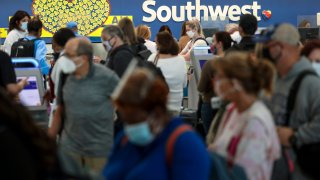
- Southwest has canceled more than 2,000 flights since Saturday.
- The airline blamed air traffic control issues, bad weather and its own staffing shortage.
- Outraged customers complained about long hold times to change flights.
Southwest Airlines shares slipped Monday after it canceled more than 2,000 flights since Saturday, disrupting the travel plans of thousands of people.
Southwest's operation improved since the weekend meltdown but cancellations continued. It scrapped 363 flights on Monday, down from 1,124 on Sunday, which was 30% of its schedule, according to flight-tracking site FlightAware.
The airline has already said it would trim its fall schedules to avoid cancellations and delays that plagued its operation during the summer. Now the carrier is weighing whether it needs to cut more.
Mike Van de Ven the Dallas-based airline's COO who was also promoted to president last month, told staff late Sunday that Southwest is still short-staffed and "we'll need to continue to adjust our schedules as this environment evolves."
"We've already made significant reductions from our previously published November and December schedules, and if we think we need to do more, we will," Van de Ven said in a recorded message to employees, which was reviewed by CNBC.
Money Report
Southwest shares lost 4.2% on Monday to close at $51.67. American added 0.3% to end at $20.13, United was nearly unchanged at $49.18, and Delta fell 0.4% to $43.19.
In August, Southwest reduced its schedule in hopes of fixing its operational struggles over the summer that regularly led to dozens of flight cancellations. Pilots, flight attendants and other staff complained about exhaustion from their grueling schedules.
Feeling out of the loop? We'll catch you up on the Chicago news you need to know. Sign up for the weekly> Chicago Catch-Up newsletter.
The weekend's issues came amid speculation that they were driven by staff's excessive sick calls tied to a federal vaccine mandate for government contractors that Southwest told employees this month it would enforce this fall.
Southwest said that was "inaccurate" and "unfounded." Casey Murray, president of the Southwest Airlines Pilots Association said pilot sick calls were in line with averages seen over the last few months as were the numbers of crews picking up open shifts, but declined to provide specifics.
The airline, like some of its rivals, has been struggling with staffing shortfalls for months. Southwest and other carriers urged staff to take buyouts or leave during the peak of the coronavirus pandemic, only to have demand bounce back faster than expected.
Van de Ven, Southwest's president, acknowledged the airline "is still not were we need to be on staffing, and in particular with Flight Crews."
"Our models use various assumptions" for the use of backup staff, known as reserve, open trips, weather, as well as sick time and overtime and "we seem to be closer to those levels during the week and then the staffing is tight during the weekends."






